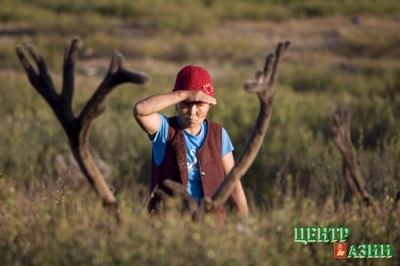 During the day, the life of the camp is paralyzed by the sun. The heat sends the reindeer huddling together in a circle. They alternate lying down: those standing up provide shade for the others. During the day, the life of the camp is paralyzed by the sun. The heat sends the reindeer huddling together in a circle. They alternate lying down: those standing up provide shade for the others.
Young calves hide beneath the bushes and under blankets that are hanging outside to dry out.
One small gust of wind is enough to make them grunt joyfully in anticipation of the coolness of the evening. A hailstorm brings them into undescribable rapture, and they scatter in all directions.
The people sit in their tents resting, both during the heat and during the hailstorm.
Saizana the Huntress
Saizana Kol, Andrei Baraan’s wife, is the one who speaks Russian best.
In 2005, she represented the Todzhans at the World Congress of the Reindeer Herders in Yakutia. Afterwards, an exchange of reindeer was carried out. The “Yakuts” were brought to Todzha, at first by train, then by trucks.
Saizana explains that after this infusion of new blood, the reindeer were sick. The females carried their fetuses too long before giving birth. The young ones, when finally born, were very sluggish and weak. But that was only temporary, it was like a vaccination reaction. By now, everything is back to normal. The “Yakuts” can be recognized easily by their huge antlers.
Saizana has received presidential and governmental awards; she is an honored worker of herding agriculture of Russian Federation. It can be said that she is the leader of this nomadic neighbor community.
Everybody consults her and listen to her opinion. She herself got used to analyzing everything and to seek justice, to protect her people.
We are sitting on reindeer skins in the tent.
We are served reindeer cheese, dried
kharius (fish), and
belyashi with roe-deer meat on a board. There is birch tea.
Quietly, we sip the milk – it is fresh, from the evening milking. It is very fatty, therefore one can’t drink much of it all at once. Mergen tried to get us to drink a liter jar of reindeer milk, pretending it was a Todzhan welcoming ceremony. You have to drink it, otherwise you will show disrespect to your host. But his eyes sparkled with mischief.
“In the winter, we hunt together with my husband, relates Saizana. – Even our daughter hunts. In winter we hunt
kabarga (musk deer). It is so risky! I am on a reindeer, with a gun, our dog runs next to me. The dog picks up the scent, and chases the
kabarga up onto the rocks; it just sits there, looking cute, until I shoot it. In winter, that is the most valuable animal
– kabarga. On the average, we can get six-seven thousand rubles for the musk gland from one
kabarga. Then in August, my brother and his wife will cover for us, and we will go nut picking.
In the fall, everybody disperses to hunt. Many women stay alone with the reindeer.
Or else, some relatives may cover for you for a while, or the neighbors help out. That is why we live together, to make things easier.
A good dog can find seven or eight sables in a day. We have five of them. They are good for finding sable, but won’t attack a bear, they are afraid. We give everything up to the buyers, nuts, furs,
kabarga musk. The money goes to the daughters, and then we come back here to our reindeer.”
The daughters study at the university in Kyzyl. They specialize in economy. They can hardly be planning to come back to the reindeer. However, who knows. Life is unpredictable.
“When the kids were at school,- continues Saizana, - they always came back home for their vacations. In winter, we camp only fifty kilometers from Adyr-Kezhig with the reindeer. We live in wood cabins. It is only three hours to ride from the settlement to our camp. When they come, we slaughter a reindeer, and spend some time together.
Nowadays we slaughter a reindeer only if we can’t get enough animals by hunting.
The skins we keep in the household, but the antlers we saw off and throw them out. Earlier, they were used for souvenirs, but now nobody needs them anymore. It is even difficult to transport them from here.
When the
sovkhoz fell apart, almost all the reindeer got eaten. We had only twelve left. We did not start selling them off, we used them as the basis for our new herd. Winters, we would buy others if we had any money from the sale of furs or nuts. Now we have more than fifty reindeer.”
A Heirloom Purse
Saizana pulls photos of her daughters from a purse embroidered with beads – seated on reindeer, in sable hats.
The fur of the reindeer is smooth, shiny, glossy in the frost. But now, in July, they are all tousled and matted like after a flogging – they are moulting.
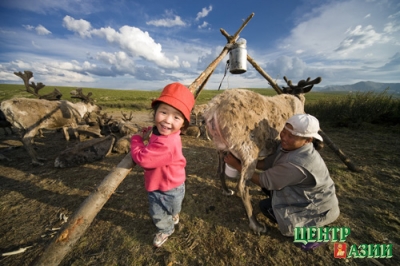 Here is a clipping from a local newspaper “Bailak Tozhu”, about a reindeer herders’ holiday, where their whole family participated in reindeer races. Here is a clipping from a local newspaper “Bailak Tozhu”, about a reindeer herders’ holiday, where their whole family participated in reindeer races.
And there is a list – today, 28 families in Todzha keep reindeer. That does not include
the Demkin family-clan community on Khamsara, and the reindeer of the professions school. At every family name, there is the number of cattle they own. Many have hardly more than a dozen. Only one person has more than a hundred. But this camp, counted all together, has hardly more than 200 reindeer.
A “burzhuyka” stove stands in the center of the tent. The upper part has to be changed every three years – it burns through.
The nights are cold, and they get the stove burning strongly in the evening. We suggested to put rocks around the bottom of the stove. The rocks will get heated, and then keep the heat for a long time.
A string is stretched above the stove, with a wreath of round sections of young
maral (deer) antlers strung up on it. They are very fresh, because the blood is not quite dried out. When they dry out, they will make a broth from them.
“I used to collect many claws for the girls, to make beads. Then my legs started hurting, there were lumps. I suffered terribly. Then one shamaness told me: claws, bad claws. She did not know that I collected claws, or that I had leg pains. She simply walked up to me and said this. I stopped collecting claws, and my leg pain went away.”
If there really is nothing to eat at home
Around the perimeter of the tent stand reindeer hide saddle bags. Saizana’s mother made them. They are very light and durable.
Everything that is in the tent, including Saizana herself, can fit on nine reindeer. On the average about 60-70 kilograms of cargo each animal.
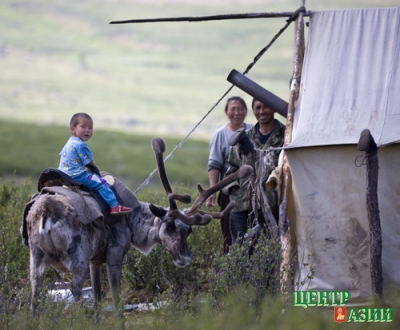 Dried fish is tasty to chew if it is soaked in tea with milk. Saizana keeps cutting pieces of cheese for us, gourmets have never even dreamed about such delicate, just barely salty flavor. Dried fish is tasty to chew if it is soaked in tea with milk. Saizana keeps cutting pieces of cheese for us, gourmets have never even dreamed about such delicate, just barely salty flavor.
“In my parents’ time, everywhere around here worked expeditions of geologists. They mostly worked here. There, behind that mountain, there used to be a bath house, - Saizana pointed out a bald peak. – I used to bring cheese to the caretakers to Kharaal, to give to the women who were cooks for the expeditions. The gold mines have been exhausted a long time ago, now people go there to fish. Fishing is great there. There is a lot of
kharius. We also prepare the fish in the fall, we use it to feed the dogs. Even reindeer won’t refuse it – they eat it too.”
The reindeer are grunting right next to the tent. The evening cool brought them back to life, and they are ready to go to the bare mountain tops.
Saizana is waiting for her husband to come home from hunting. She feeds us delicacies, but she herself won’t touch anything. She says – I’ll eat when Andrei comes back.
We noticed already during the day that before the men leave to go hunting, everything that has already been cooked is eaten. Nothing should be cooking in the kettles. It is a custom. The hunt will be successful only if there really is nothing left to eat at home.
When the stores are running out
Roman Baraan has a snow-white, Hollywood smile. Those who create advertisements for “Colgate” tooth paste obviously have no idea where to find their super-hero.
He takes care of his herd together with his wife Oksana and three-year-old grandson Mengi. The rest of the entire family lives, mostly, in the city: they served in the army, finished school, and the city cycle turned. Their daughters are in Kyzyl. From the whole large clan, he is the only one who became a reindeer herder.
“The reindeer get sick from the heat, - says Roman. – Many of them are limping already. Before, in the spring, they would get vaccinated, but now nobody comes here. A guy from Saryg-Sep brings provisions. Barter type exchange, just like in ancient times.”
We get treated to soup from roe-deer meat. But we are aware that the stores of meat in the camp are running low. A skinny dry reindeer leg hangs only behind Omak’s tent.
Already for a week they could not find any animals. Yesterday’s hunt was without results, even though we observed all the customs. Andrei wounded a bear. Omak did not even see anybody.
For extreme situation, we have some stew and chicken cubes. But that is like bread crumbs for an elephant.
Here, in the camp, even little children if given a choice between a piece of candy or a steak will pick the latter.
Saizana says that if this keeps up for a few more days, they will have to slaughter a reindeer.
A Prize at Dawn
Early in the morning, Roman quietly called us out of the tent. We decided last night to go up the nearby mountain in the morning to meet the dawn.
It was not even four in the morning, but light was already showing in the east. Roman was seriously equipped: he carried a gun, binoculars, and firm intentions. We loaded up on camera technology and in half an hour, drenched from running, we were at the top of the world.
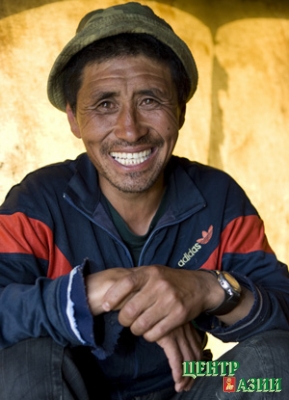 The universe must have been born in silence like this. The sun, as it was waking up, was showing us how the world was made. The universe must have been born in silence like this. The sun, as it was waking up, was showing us how the world was made.
At first, faint contours of the mountains became visible, with the slopes and ravines.
Then the smooth surfaces of countless lakes began to sparkle, the spider-web of streams poured over the earth, stones became partridges who, not noticing the dawn, still trusted in their invisibility.
As the sun rays painted everything alive with colors, the wind woke up. The Khan lakes opened their three eyes and started drinking the blue from the sky. The picture was complete.
All this time, as we watched the creation of the world, Roman sat on his heels and intensely looked around with his binoculars.
He was also waiting for the sun to color the forest meadows. He needed a red-brown color. The color in which a
maral or roe-deer dress up. After a couple of hours he silently handed me the binoculars and pointed out the direction.
On the third attempt, I saw a tiny dot moving on the slope of the mountain opposite us. Roman said that this was a
maral, and that it is far away.
On the other side of our mountain, Roman became animated and ran down. There, at the edge of a small lake, two beauties, perhaps male and female, were majestically standing. They were going to get their morning drink of water.
For a moment, we lost our nerve and started to think in a “Greenpeace” mode. But then we remembered the tired and discouraged faces of the hunters who returned back to the camp every night with empty hands, falling down on their legs numb from walking all day over mountains and marshes, and we wished Roman luck.
There were four shots. He wounded the
maral with the first shot, the rest was to finish him off. He could have shot the second one too, but that would not have been acceptable. First eat this one, then go hunting again. Animals should not be killed for reserve.
Sharing with everybody
Roman returned to the camp before us. At the same time he managed to butcher the carcass of the dead bull. To be exact, the speed of his walk was no worse that the run of the reindeer.
Everybody’s faces had pleased and happy expressions. They were slapping Roman’s shoulder, and telling us “thank you”. Well, if you had not wanted to go to meet the dawn, there would be no
maral for us.
It worked out just like in the saying – early bird gets the worm.
Three-year-old grandson Mengi was running around with wild shouts around the reindeer suffocating in the heat. The others translated for us. He was yelling “My father killed an animal!!!”
At lunch time, they brought the carcass to the camp on several reindeer. According to custom, Roman got only the head, skin, and meat from the back. The rest of it was divided equally among the families of the camp. The internal organs were boiled and eaten by all, throwing the best pieces into the fire. The food had to be shared with the Master of the Taiga.
The track to the mineral spring passes by the camp. Two days of travel, and you are at Ush-Beldir. If rows of horses stream by, that means the travelers are from Kaa-Khem district, if reindeer are passing by, they are Todzhans.
Right at the moment of sharing the meat, the travel became more active. Roman cut off pieces of meat and gave it to the travelers. Either he was treating them, or possibly he was observing the custom “uzha”. This is when any person who meets a hunter who is either hunting or bringing the meat home, can call out “Uzha!” and will receive a share of meat.
The Law of the Taiga
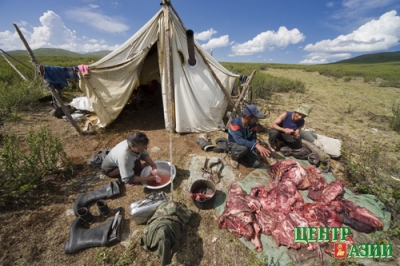 Brian Donahue, an American scientist, studied the custom “uzha” and other subtleties of the laws of use of clan hunting areas of Todzhans for several years. Brian Donahue, an American scientist, studied the custom “uzha” and other subtleties of the laws of use of clan hunting areas of Todzhans for several years.
He learned Tuvan language and collected material for his doctoral dissertation. He married a local girl and took her away with him.
He is well known here, in Tofalaria, and in the Oka district of Buryatia – the areas of range of the Sayan reindeer and Sayan reindeer herders- hunters.
The understanding of the rights of land prperty is markedly different for Todzhans and, for example, Tofalars. Donahue explains this by the degree of contact with Russians.
In Todzha, there is no exclusive right to hunt, or fish, or graze reindeer at any specific territory. The clan zones, in a way, belong to the clan, but nobody gives it the meaning of private property.
If a stranger comes, they do not chase him away. On the contrary, they are expected to help him - to shelter him in a tent, feed him, and show him a good place to hunt.
The law of the Taiga is – help.
Anybody can try out their strength here and receive according to their abilities. And nobody can take from the Taiga more that what she allows.
If you love and know this land, she will give you everything.
The best of everything for the guest
In Soyan-ool’s tent, there is a smell of fresh bread. Kakpak. They make it with soda and a lot of flour, and it looks compacted.
The vessel with the dough is put into the oven. Forks, spoons, tooth brushes – two large ones and one tiny one, for Almira, their daughter, hang on the canvas wall.
Soyan-ool returned only a while ago from preparing wood. There are no trees around here, just groups of dwarf birch, so it is necessary to descend down closer to Khan lakes – there is a lot of dry cedar there.
They seat us in the places of honor – opposite the entrance of the tent. But Misha needs to photograph with the light behind his back, and he does not want to go deeper into the tent.
“Here, here!” – Soyan-ool gestures, not understanding why Mikhail refuses the invitation.
Choigana, Soyan-ool’s wife, pours out tea for us, hands us a jar of reindeer cream,
and the freshly baked kakpak.
The jar is cool because it was just brought in from a natural refrigerator – a mountain stream. That is where they keep milk and meat.
Completely unobtrusively, Soyan-ool and Choigana leave the tent.
“Now you are masters here, - explains Saizana their departure. – That is the way we do things here – give everything best to the guest and leave”.
But we came here to meet them! And I quickly bring back the hospitable hosts to our hut.
We almost never let Saizana a step away from us. She is our translator.
Such upbringing
All the children crowded into the tent. Mengi is the most active one of them. He got his first haircut only recently; children’s hair is not cut until they turn three.
“Pa, pa!” he stretches out his fingers, bent into incomprehensible shapes. His entire palms are stained with something red. And not his palms only – all the kids have hands of that color.
I figure it out from the shreds on the floor. It is “Yupi”, a sweet powder for mixing with water. They pour it into their hands and lick it like candy.
Misha photographs Mengi as he demonstrates how he can reach into his nose with his tongue, then shows him the picture. He recognizes himself and laughs. The other children sit there silently.
“That is the way they are brought up in the taiga, - explains Saizana. In the settlement, they do not do this. Children should be quiet when adults are talking. Mengi is too small – he does not understand yet. But they are completely prohibited to come here at all when we talk. But you are unusual guests, so we allowed them to sit here.”
We decided to cheer up the serious little kids.
We sang songs in “cartoon” voices, made faces, went “muuuu” and “baaa”. Mergen played along. His “ram aria” turned out very well. Chicken noises finally started the kids laughing. Never before have they seen such crazy adult guests.
Evening games
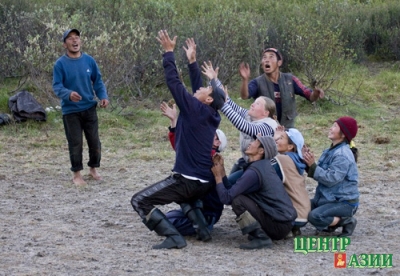 Everybody here plays volleyball. Without exception. Every evening after the evening milking, all the adults gather into a circle for the game. The children nearby play at riding reindeer, giving each other rides in turn. Everybody here plays volleyball. Without exception. Every evening after the evening milking, all the adults gather into a circle for the game. The children nearby play at riding reindeer, giving each other rides in turn.
Today they gathered late for the game. Every family was busy all day with meat preparation: small pieces, soaked in salt water, were hung up like laundry on wooden poles. But everybody was pleased – they had eaten well.
The ragged yellow ball flies at me with such force, that it is simpler to get out of its way than to hit it back. It hurts the hands. A team of Todzhan reindeer herders would definitely take gold at the Olympics.
Sholban, a young hunter from Kaa-Khem, runs around the circle with wild speed. He has astonishingly fast reflexes. I barely manage to turn my head from side to side, and the ball is already somewhere else.
Sholban is not a native of Todzha, but he has been already living here with the reindeer herders for several years. He also served in the fleet, like Omak. He had some idea of serving on, going to school, but did not have the courage.
He suffered from lack of employment in the settlement. The Taiga turned him from a bad life. He says:
-When I am here, I do not get any foolish ideas in my head. I could have probably gotten into some kind of trouble, but this saved me. I go to the settlement only to sell whatever I get in the taiga. And then I go back right away.
-And do you think that he’ll save you? – Sholban points at my little cross. It is hard to find an answer.
- In Christianity, there is a lot of good, but what I don’t like is that they always call people slaves of God, - thoughtfully says Sholban. – I do not like that word – slave.
But they do not need it
“Girls, come here, quickly! Come over here, run!” we heard Misha shout from the direction of the stream.
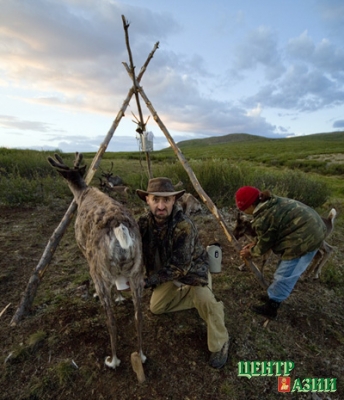 We were getting ready for the trip back, have loaded the backpacks on the reindeer and horses, but we decided to splash a little in the cool water before the trip. The day promised to be hot, and even though we were going to pass many lakes and little rivers on the way, which promised to quench our thirst with tasty Sayan water, we thought it better to drink our fill here. We were getting ready for the trip back, have loaded the backpacks on the reindeer and horses, but we decided to splash a little in the cool water before the trip. The day promised to be hot, and even though we were going to pass many lakes and little rivers on the way, which promised to quench our thirst with tasty Sayan water, we thought it better to drink our fill here.
Under way, it is necessary to stick close together and to move at speed, because bears are all around. Everywhere you see their footprints and ravaged stores of nuts that
burunduks (ground squirrels) have gathered. Our guides can, while riding, without getting off the reindeer, lean over and gather a handful or two of water. There is no way we could try that. It is a whole art.
Misha was standing with his legs wide on the bank of the stream. Leaning his head towards the water, it seemed that he was trying to see something there. The “something” seemed to be slipping away, and he was with his back to us, his head bent over.
“Look, look! That is incredible! Do you see it?” –his astonished eyes were shining.
Vika and me sat down on our heels and started looking into the water, which was quietly gurgling among the growth of the bushes.
“Sit away from each other,- said he, seeing that we could not understand what the secret was. - You are throwing a shadow.”
The stream, deep about like half the length of one’s index finger, was glittering with sun reflections. The rays, like x-ray, were lighting up small pebbles, making them shine with many colors. On a cloudy day, they all were simply gray. But today, they shone like Ural gems. Each and every one of them glitters, sparkles in the sun. Even the smallest grain of sand shines like gold. And that is what it is…
And suddenly it opened in front of our eyes: the entire bottom of the stream was covered with grains of gold. They were everywhere: on a small pebble, buried in the sandy bottom of the stream, churning in the icy water. And also on the tussocks of the marsh, where the stream continued on its way through the mountain tundra like a hidden snake, there were tiny sparkling grains.
We started to gather water in our fists, together with the pebbles and earth. It ran down our elbows, leaving tiny grains with a metallic shine in our hands.
Close by, the children were splashing in the water, and downstream, where the stream fell into a small depression, Roman was filling vessels with water.
“That is interesting, but do they know about it?” – Misha asked, looking towards him.
All three of us, looking at Roman, suddenly understood that they do know about it.
But they do not need it.
Photos:
-
Saizana Baraan has sharp eyesight.
-
Morning milking. Alla Kol and her daughter.
-
The youngest reindeer herder Mengi, grandson of Roman Baraan and Oksana Duganchi.
-
Hollywood
smile of successful hunter Roman Baraan.
-
The law of the camp: the meat is shared among everybody. Omak Baraan, Roman Baraan and Oksana Duganchi dividing the carcass.
-
Everybody in the cmp plays volleyball. And to keep up with them is not easy.
-
Misha is learning how to milk a reindeer. It works, but not quite.
|
